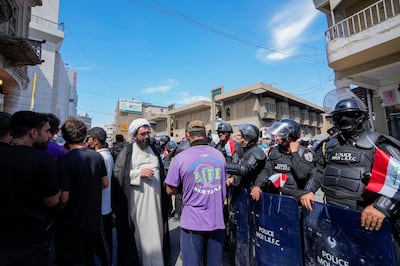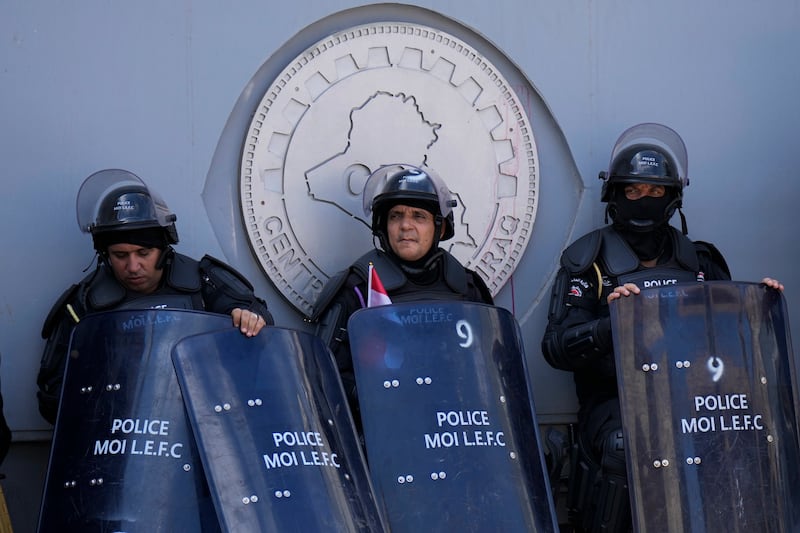Recent measures taken by the Central Bank of Iraq are causing concern and anger among Iraqis looking to gain access to dollars amid the ongoing instability of the local currency.
A senior official at the central bank on Thursday said that Iraq was embarking on a rapid but phased plan to de-dollarise through 2024 in an effort to control efforts by fraudulent companies and sanctioned individuals to purchase billions of dollars through its currency auctions.
But the measures are having a major impact on Iraqis: one Baghdad-based journalist has been unable to gain access to her salary, which was transferred from her employer in US dollars, since August.
“Every time I go, they say the Central Bank of Iraq is not giving us enough dollars to pay for customers,” the journalist, who works with a foreign media outlet, told The National on condition of anonymity.
“They say, 'We can only pay you in Iraqi dinars considering the official exchange rate', which is far from the rate at the parallel market.
“After many attempts, they offered paying me only a quarter of my salary in dollars and the rest in Iraqi dinars, but I refused.”
This is the latest episode in the government's struggle to control the fluctuating exchange rate, which has seen the Iraqi dinar tumble against the dollar since late last year, causing chaos in local markets.
Since then, Washington has been pressing Iraq to slow the flow of dollars through the foreign currency auction run by the CBI to countries under US sanctions, including Iran, Syria and, to a lesser extent, Lebanon, where some people and groups have been sanctioned by the US Treasury.
The Federal Reserve Bank of New York has applied strict measures on requests for international transactions from Iraq, rejecting many and delaying others.
It has also blacklisted several Iraqi banks suspected of money laundering and carrying out suspicious transactions. The latest restrictions were put in force in July, when 14 private Iraqi banks were barred from conducting dollar transactions.
This has led to an increase in demand for US dollars on the black market in Iraq.
The government has taken several measures to protect the dinar, including a currency revaluation, banning dealing with the greenback in the market, and offering a specific amount of hard currency for traders and travellers at the official rate.
The CBI also set up a platform to regulate wire transfers, which make up the bulk of its dollar demand, that used to be a hotbed of fake receipts and fraudulent transactions that siphoned off dollars to sanctioned countries.
But all that failed to close the gap between the rate on the black market, where the dollar stood on Thursday at about 1,570 dinars. The official rate is 1,320 dinars to the dollar.
De-dollarisation plan
Late last month, the CBI said it would restrict all internal trade and transactions to the Iraqi dinar starting next year.
But it will allow Iraq's foreign trade to be settled in currencies other than the dollar, including the euro, Emirati dirham, Turkish lira and Indian rupee.
On Thursday, a CBI senior official told Reuters the new measures would include banning cash withdrawals and transactions in US dollars.
Mazen Ahmed, director general of investment and remittances at the CBI, said the move aims to stamp out the illicit use of about 50 per cent of the $10 billion that Iraq imports in cash from the New York Federal Reserve each year.
People who deposit dollars in banks before the end of 2023 will still be able to withdraw funds in dollars in 2024, Mr Ahmed said, but dollars deposited in 2024 will only be able to be withdrawn in local currency at the official rate.
“You want to transfer? Transfer. You want a card in dollars? Here you go, you can use the card inside Iraq at the official rate, or if you want to withdraw cash, you can at the official rate in dinars,” he said.
“But don't talk to me about cash dollars any more.”
Later on Thursday, the CBI issued a statement saying the Reuters report was inaccurate.
In its clarification, it said that the ban on cash dollar withdrawals as of January 1 would only affect dollar transfers from abroad, while the dollar account balances of Iraqi citizens would not be affected.

Growing public anger
The Gulf War in 1991, followed by harsh UN-imposed economic sanctions and the US-led invasion in 2003, caused a substantial devaluation of the Iraqi dinar. As a result, Iraqis have turned to the US dollar for a wide range of transactions, from wholesale trading to retail purchases.
“Honestly, this is unfair,” the journalist said. “We are employees who pay taxes and our account balances are real ones and that we can't be victims to the thefts and smuggling of the hard currency others do.”
On Thursday, video circulated on social media showing a depositor at a private bank in Baghdad threatening to burn it down if he did not receive funds from his account dollars, in a scene reminiscent of Lebanon's banking crisis.
“I swear I will burn it down. I swear I will enter the safe and take my money” the man says in the video.
Mr Ahmed said some banks were low on dollars because many people were trying to withdraw all at once amid a feeling of unease over the financial system, while some banks also had shortages because they provided dollar-denominated loans that were then paid back in dinars.
The CBI has also limited the amount of dollars it is providing as part of an agreement with the US Federal Reserve to limit cash and shift towards e-payments, he said.







